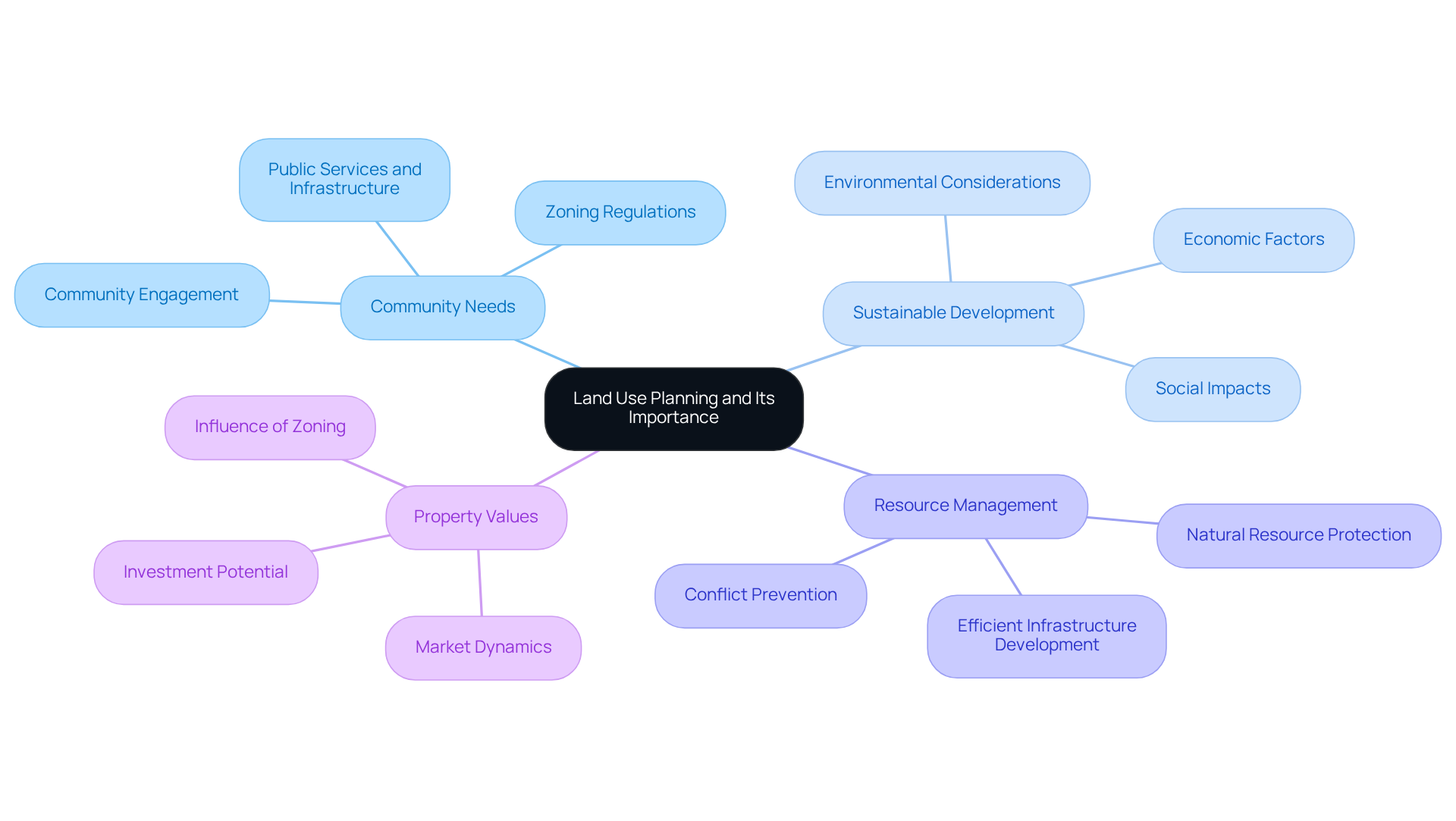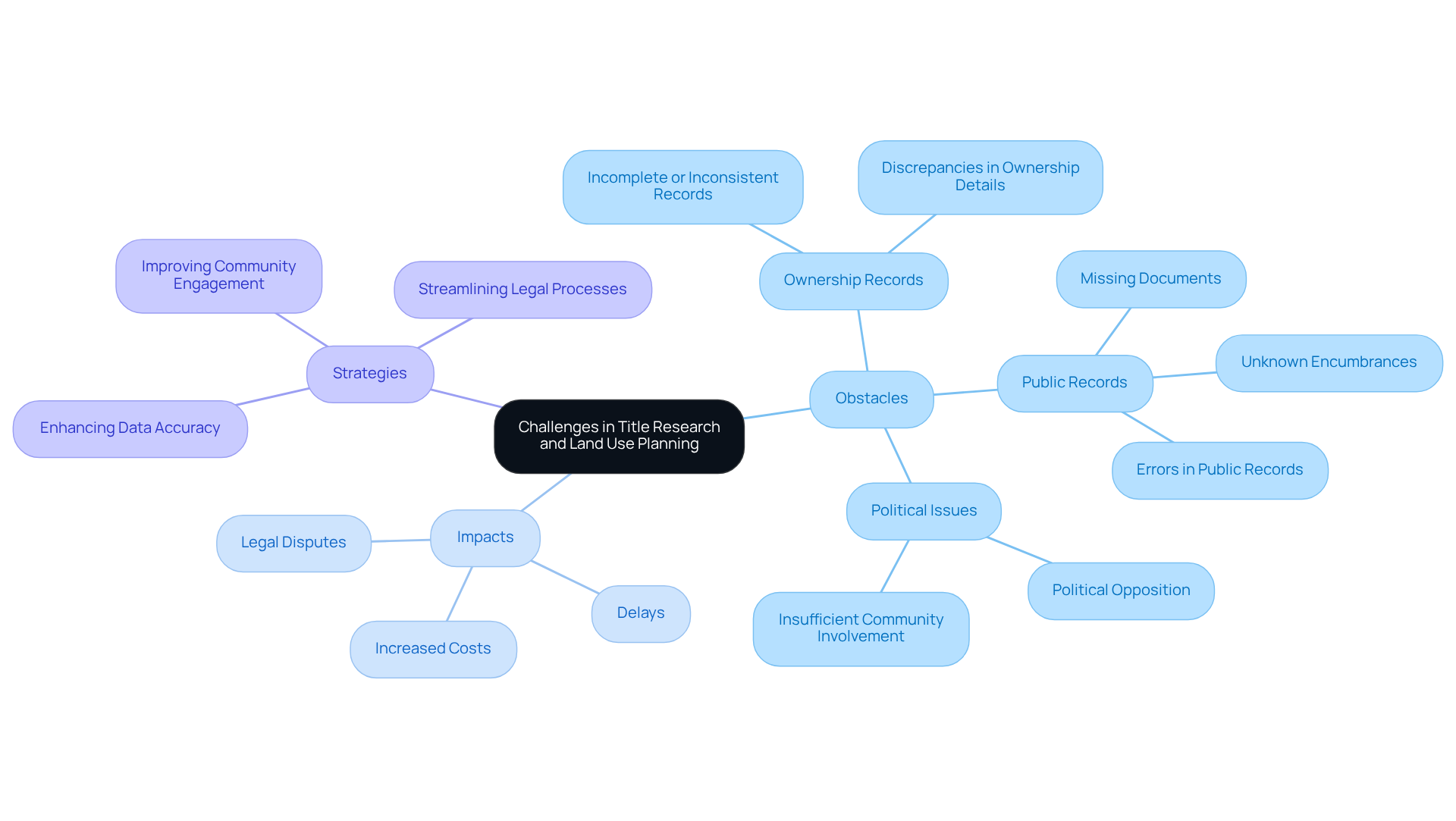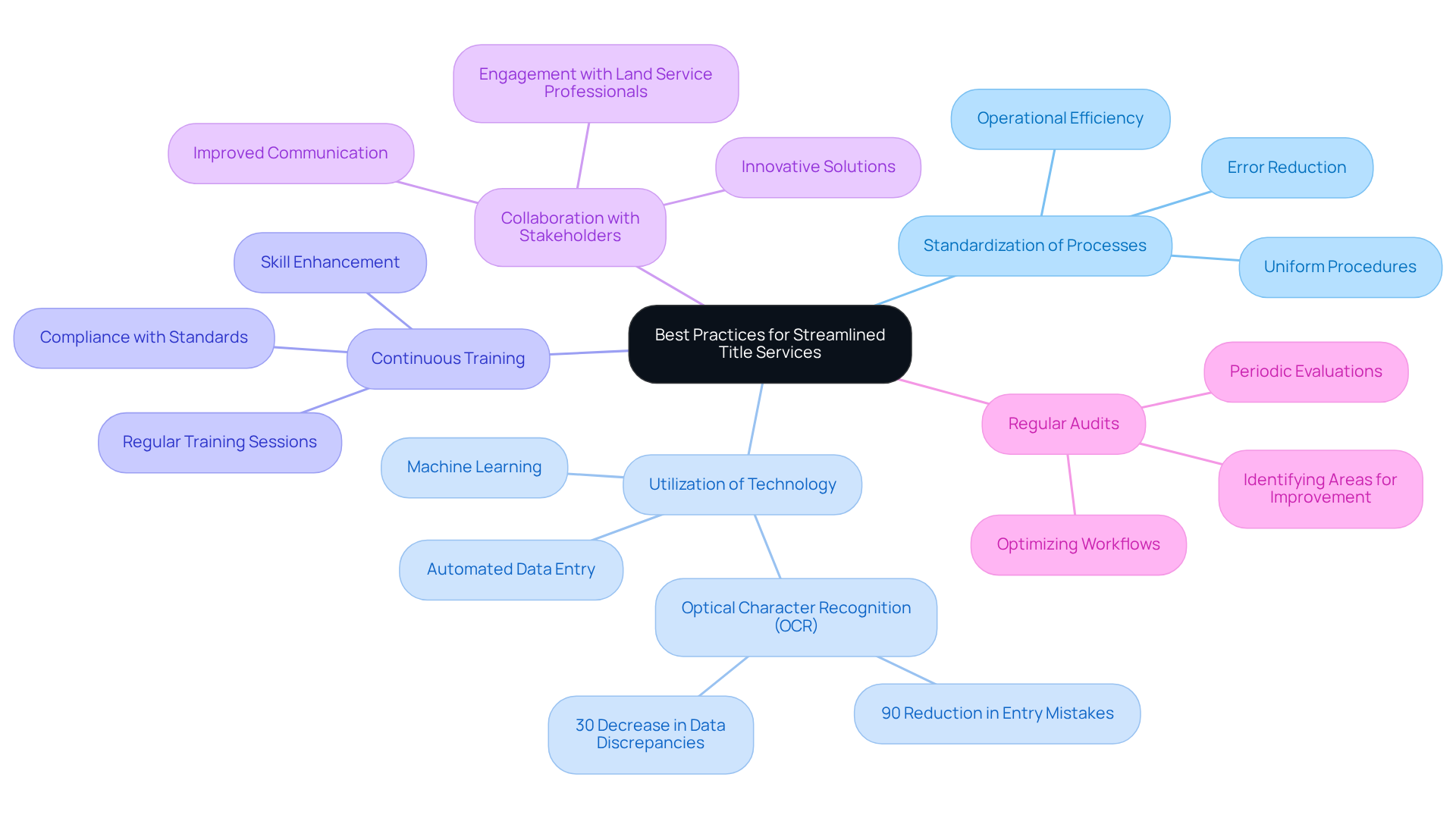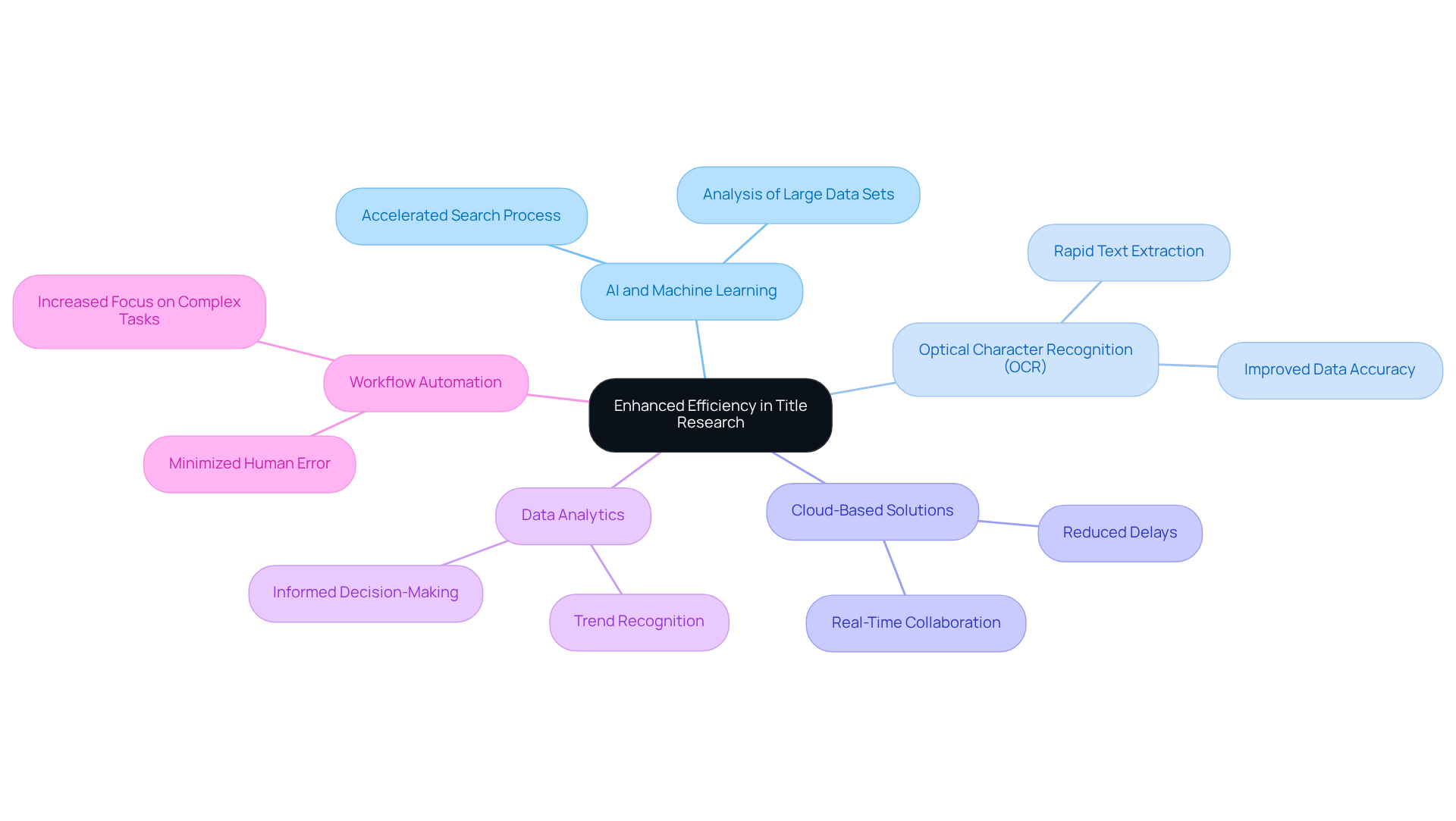Overview
The article presents best practices for enhancing efficiency in land use planning and title services, underscoring the critical role of standardized processes, technology adoption, and stakeholder collaboration. It articulates how these strategies significantly minimize errors, streamline operations, and ultimately yield superior property research outcomes and foster community alignment.
Introduction
Land use planning and title services are pivotal in shaping sustainable communities and ensuring efficient resource management. As urban landscapes transform, the demand for strategic frameworks that balance community needs with environmental considerations becomes increasingly crucial.
However, real estate professionals often grapple with significant challenges, ranging from incomplete ownership records to the complexities of legal terminology.
How can stakeholders navigate these obstacles to enhance efficiency and promote effective land use planning?
This article delves into best practices that not only streamline title services but also foster a more cohesive approach to land use, ultimately paving the way for thriving, resilient communities.
Define Land Use Planning and Its Importance
Land use planning and title services is a strategic process that evaluates and governs utilization to align with community needs, while factoring in environmental, economic, and social considerations. This framework is essential for directing and resource management, ultimately preventing conflicts over usage, promoting efficient infrastructure development, and safeguarding natural resources. For real estate professionals, a comprehensive understanding of land use planning and title services is vital, as it significantly influences property values, zoning regulations, and the feasibility of development projects.
Recent trends highlight an increasing focus on flexible zoning laws that support mixed-use developments, which can elevate property values and encourage community engagement. Furthermore, expert insights underscore the necessity of aligning land use planning and title services with community needs to ensure organized urban development, mitigate environmental impacts, and enhance overall community well-being. As urban areas continue to evolve, effective land use planning and title services will be instrumental in shaping sustainable and dynamic communities.

Identify Challenges in Title Research and Land Use Planning
Obstacles in property research often affect land use planning and title services due to:
- Incomplete or inconsistent ownership records
- Discrepancies in property ownership details
- Complex legal terminology that can pose significant challenges
Title researchers frequently face issues such as:
- Missing documents
- Errors in public records
- Unknown encumbrances, complicating the verification of property ownership
Furthermore, land use planning and title services can be hindered by:
- Political opposition
- Insufficient community involvement
- Inadequate information to guide decision-making
These challenges can result in:
- Delays in project approvals
- Increased costs
- Potential legal disputes
This underscores the necessity for professionals to devise effective strategies to surmount these obstacles.
To illustrate the impact of information quality on title research, consider the case study titled ',' which demonstrates that organizations may incur losses of up to $15 million annually due to flawed information. This not only diminishes operational efficiency but also leads to inadequate analytics and compliance risks. Such findings emphasize the critical need for precise and comprehensive ownership records.
In addition, incorporating insights from industry leaders can offer valuable perspectives. As Carly Fiorina articulated, 'The goal is to convert information into knowledge, and knowledge into insight.' This statement underscores the importance of prioritizing information accuracy in ownership research and in land use planning and title services.
To effectively tackle these challenges, experts in the field must formulate robust strategies that prioritize data accuracy and completeness, thereby ensuring that property research aligns with land use planning and title services, making the processes both efficient and reliable.

Implement Best Practices for Streamlined Title Services
To enhance the efficiency of title services, professionals should implement several best practices:
- Standardization of Processes: Establishing uniform procedures for name searches and document management significantly reduces errors and enhances operational efficiency. This approach not only streamlines workflows but also fosters consistency across the organization.
- Utilization of Technology: Embracing advanced technologies such as machine learning and optical character recognition (OCR) automates repetitive tasks, allowing researchers to concentrate on more complex issues. The incorporation of OCR has been demonstrated to decrease entry mistakes by as much as 90%, resulting in quicker and more precise searches for names. Furthermore, automated data entry can achieve up to a 30% decrease in data discrepancies, thereby improving the reliability of service offerings.
- Continuous Training: Regular training sessions on the latest tools and regulatory updates are essential for enhancing staff skills and ensuring compliance with industry standards. This commitment to ongoing education empowers employees to leverage technology effectively, ultimately improving service delivery.
- Collaboration with Stakeholders: Engaging with land service professionals and local authorities in land use planning and title services facilitates better communication and information sharing, resulting in more precise property research outcomes. Collaborative efforts can lead to innovative solutions that address common challenges in the industry.
- Regular Audits: Conducting periodic audits of document processes helps identify areas for improvement and ensures adherence to best practices. These evaluations can uncover inefficiencies and provide insights into optimizing workflows, thereby enhancing overall performance.
By adopting these best practices, agency firms can significantly improve their operational efficiency, reduce turnaround times—which are critical for winning repeat business—and enhance customer satisfaction. For instance, a National Title firm effectively decreased clearance time from 2-4 hours to merely 20 minutes via automation. As Lili Farhandi observes, "The insurance sector is on the verge of a significant transformation, with LLMs offering a chance to create groundbreaking efficiencies and precision." Ultimately, these strategies position agencies for in a competitive landscape.

Leverage Technology for Enhanced Efficiency in Title Research
Technology plays a crucial role in enhancing efficiency in document research. Professionals must recognize the value of the following approaches:
- Adoption of AI and Machine Learning: Implementing AI-driven tools can significantly accelerate the search process by swiftly analyzing extensive volumes of information and identifying pertinent details.
- Optical Character Recognition (OCR): Utilizing allows for the rapid extraction of text from scanned documents, facilitating the digitization and organization of record information.
- Cloud-Based Solutions: Transitioning to cloud-based platforms promotes real-time collaboration among team members and stakeholders, thereby improving communication and reducing delays.
- Data Analytics: Employing data analytics tools aids in recognizing trends and patterns in research, enabling informed decision-making and risk evaluation.
- Integration of Workflow Automation: Automating routine tasks such as document generation and approval processes minimizes human error and frees up valuable time for title researchers to focus on more complex issues.

Conclusion
Land use planning and title services serve as pivotal components in shaping sustainable communities and ensuring efficient property management. By strategically evaluating land utilization, these practices align with community needs and environmental considerations, ultimately fostering organized urban development and enhancing property values. A robust understanding of these elements is crucial for real estate professionals as they navigate the complexities of zoning regulations and development feasibility.
Key challenges in title research and land use planning have been highlighted, including:
- Incomplete ownership records
- Political opposition
- The necessity for community involvement
Addressing these obstacles through best practices such as:
- Standardization
- Technology adoption
- Continuous training
- Stakeholder collaboration
can significantly enhance operational efficiency. Furthermore, the integration of advanced technologies like AI and OCR streamlines processes, ensuring accurate and timely outcomes in title services.
Reflecting on the significance of these practices, it is evident that prioritizing effective land use planning and title services is essential for fostering sustainable development and community well-being. As the landscape of urban planning continues to evolve, embracing innovative solutions and collaborative approaches will be vital. Professionals in the field are encouraged to take proactive steps in implementing these strategies, thereby contributing to a more efficient and responsible framework for land use that benefits both communities and the environment.
Frequently Asked Questions
What is land use planning?
Land use planning is a strategic process that evaluates and governs the utilization of land to align with community needs while considering environmental, economic, and social factors.
Why is land use planning important?
Land use planning is essential for directing sustainable development and resource management, preventing conflicts over land usage, promoting efficient infrastructure development, and safeguarding natural resources.
How does land use planning affect real estate professionals?
A comprehensive understanding of land use planning and title services is vital for real estate professionals, as it significantly influences property values, zoning regulations, and the feasibility of development projects.
What recent trends are observed in land use planning?
Recent trends highlight an increasing focus on flexible zoning laws that support mixed-use developments, which can elevate property values and encourage community engagement.
How does land use planning align with community needs?
Aligning land use planning and title services with community needs is necessary to ensure organized urban development, mitigate environmental impacts, and enhance overall community well-being.
What role does land use planning play in urban development?
Effective land use planning and title services are instrumental in shaping sustainable and dynamic communities as urban areas continue to evolve.




